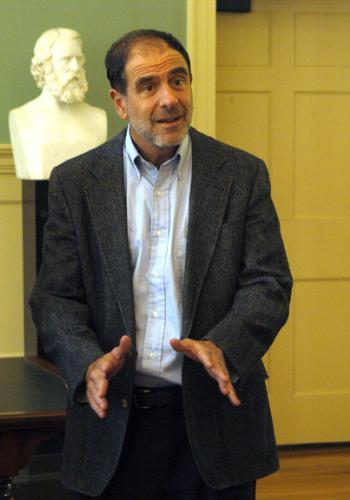The letter Dean of the Faculty William C. Kirby sent to professors last October to kick off the current curricular review was filled with questions:
“What will it mean to be an educated woman or man in the first quarter of the 21st century? What should a Harvard graduate know in depth about a discipline or area? What are the enduring goals of a liberal education and how can they be provided in the setting of a modern research university?”
These questions are among those that will frame the third sweeping examination of the philosophy and structure of the undergraduate experience at Harvard in the last 60 years.
Though the review officially began in October, the four main committees that will lead the Faculty through the process were not announced until the beginning of May and will not begin meeting regularly until next fall.
This year was devoted mostly to finding students and professors to serve on these committees and to initiating discussion of the major issues and themes that the committees will seek to examine.
In his letter, Kirby urged the Faculty to approach the review by actively and energetically challenging any assumptions they might have about learning at Harvard.
“We should not shy away from the simplest—and hardest—questions,” Kirby warned.
Topics under consideration will run the gamut from finding a balance between academics and extracurriculars, to determining how best to teach the sciences; from fostering greater faculty-student contact to figuring out what to do with the much-debated Core curriculum—the establishment of which was the cornerstone of the last curricular review.
It is an ambitious load that will be tackled, Kirby and other top administrators say, in just a year’s time.
The current projected schedule calls for a “short interim report” by the end of January and for “preliminary plans” to be completed by the end of the year, according to Dean of Undergraduate Education Benedict H. Gross ’71.
If all goes according to plan, the new and improved curriculum is expected to be in place as early as Fall 2005.
But if the last curricular review is any indication, the one-year timeline may prove to be a challenge, especially if discussions next fall lead to recommendations for the dramatic revamping of the Harvard curriculum that Kirby’s rhetoric suggests.
Keeping With the Times
Harvard has developed a tradition of reviewing its undergraduate curriculum every 25 years.
Against the backdrop of World War II, then-University President James B. Conant ’14 appointed a group of professors to examine the role of “education in a free society,” with a specific focus on the way Harvard educates its undergraduates. That group’s work gave rise to the creation of the General Education (Gen Ed) system, the academic predecessor to the Core that established a set of distribution requirements for all students.
Read more in News
Pataki: 'Yale is Going to Crush Harvard'













